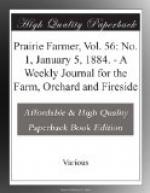We have letters from several parties desiring us to publish an offer they make to send packages of seed corn and other seeds to any one applying and inclosing stamps to pay for trouble and postage. Some of these parties also send samples of the seed. There is one great difficulty in the way of publishing this class of communications. Once we begin, the door is open to the practice of petty frauds upon our readers which we have no right to encourage or allow. Now we are almost certain that all these writers, thus far, are honorable men, who wish to confer a favor upon their brother farmers, and who do not wish to gain a farthing in the transaction. But some of them are personally unknown to us, and we do not feel like vouching for their responsibility, still less so because it is difficult to tell who will next propose a similar scheme. There is to be a brisk trade in seed corn during the next four months, and parties having a well tested article will find no difficulty in disposing of it at good prices, providing they can convince people they have exactly what they claim. The way to do is to advertise the seed corn in the regular way, giving as references such men as the postmaster, justice of the peace, banker, etc., as may be most convincing and convenient. We are as anxious as any one can be to see the people supplied with well ripened and well cared-for corn grown in the proper latitude, and we are equally anxious to guard them against imposition.
THE PORK QUESTION IN EUROPE.
The question of admitting American pork into France is not yet settled. The Corps Legislatif is again “all tore up” by rash statements made by member M. Paul Bert, who has published a letter at Paris in which he argues that the use of our pork must result in disease, and that a general outbreak may be feared at any moment, so long as the products of diseased swine are offered in French markets. He endeavors to strengthen his position by pretending to quote from Dr. Detmers, Department of Agriculture Inspector at the Chicago Stock Yards. He alleges that Detmers has reported that diseased and dying hogs are sold daily in Chicago, and then shipped as pork, bacon, and lard to Havre and Bordeaux. To this audacious or mendacious charge Dr. Detmers replies as follows:
The statement made by M. Paul Bert, as contained in a cable dispatch from Paris, is not only a perversion of facts, but a falsehood cut from whole cloth. I never certified, wrote, or said that dead hogs are shipped to packing-houses, or that these carcasses are shipped abroad. All I ever said in regard to transportation of diseased or dead hogs is contained in my official reports to the Commissioner of Agriculture, Washington, and can be found in his annual reports of 1878 and 1879, on pages 355 and 418 respectively, where it is accessible to everyone. I simply called attention to the transportation of diseased and dead hogs




